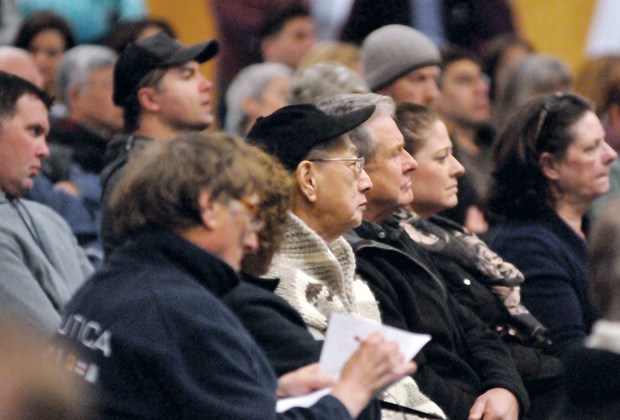Children on Windridge Drive would be safer with the proposed drug and alcohol treatment centre than without it, according to the North Shore’s top doctor.
That was one of the revelations that emerged from a community meeting that brought 300 concerned residents to the Parkgate Community Centre gymnasium Wednesday evening to discuss the nine-bed, men-only Turning Point Recovery Centre proposed for Windridge Drive.
A recovery house for medically stable patients dealing with addiction is needed, according to Dr. Mark Lysyshyn, medical officer for the North Shore.
Every month at least one North Shore resident dies from a cause related to substance abuse, ranging from drunk driving to cirrhosis of the liver, according to Lysyshyn.
While the Turning Point house could be a boon to the approximately one in five Canadians who deal with addiction in their lifetime, the site also poses “no risk” to children, he said.
“I would suggest communities that don’t have these services provide a greater risk to children because fathers and uncles and brothers will not have access to these services in their community,” Lysyshyn said.
The centre may be needed but the wisdom of placing it in the middle of a busy suburban area is questionable, according to several neighbours who spoke at the meeting.
Another group home on Windridge Drive would be one too many, according to Cynthia Swales, who lives on the street. Residents are already coping with a group home for people with physical and mental disabilities – at least one of whom has displayed violent tendencies. “We have a lot of problems with them. They are not a good neighbour,” Swales said.
Turning Point executive director Brenda Plant told the audience the society does not accept violent offenders. That touched off a heated exchange with a resident who pointed out the possibility of a violent offender lying his way into treatment.
The fear of declining property values was also raised. However, there is no empirical evidence to show Turning Point would cause neighbouring property values to dip, according to a representative from BC Housing who attended the meeting.
Community members have spearheaded petitions both for and against the house.
Lynn Valley resident Kelsey Beazer has garnered the most signees thus far, with 284 people pledging to support the project. “There are hundreds of North Vancouverites who support this,” she said.
A few of those supporters discussed their pasts with addiction at Wednesday’s meeting.
After starting to drink in high school, Wendy Wong became an alcoholic and was forced to leave her West Vancouver home, eventually finding sobriety while living on a boat. “By the grace of God I stayed sober but it shouldn’t have been that hard,” she said.
The centre would be a benefit to the community, said Wong. “Our kids are in danger because of drug addicts on the street, people drunk driving, violence in the home . . . our kids are not in danger because people are trying to get and stay clean and sober,” she said.
The centre would repel drug dealers by creating increasingly vigilant residents, according to Alan Podsadowski, who works with First Nations addiction and wellness counsellors as the executive director of the Indigenous Certification Board of Canada. “The last thing drug dealers want is vigilant residents. Drug treatment programs are the kryptonite for drug dealers.”
If approved, the district would lease the land to BC Housing for $1 a year, and in turn BC Housing would contract Turning Point to operate the facility.
In order for the land to be rezoned, the project would need a majority vote from district council.



